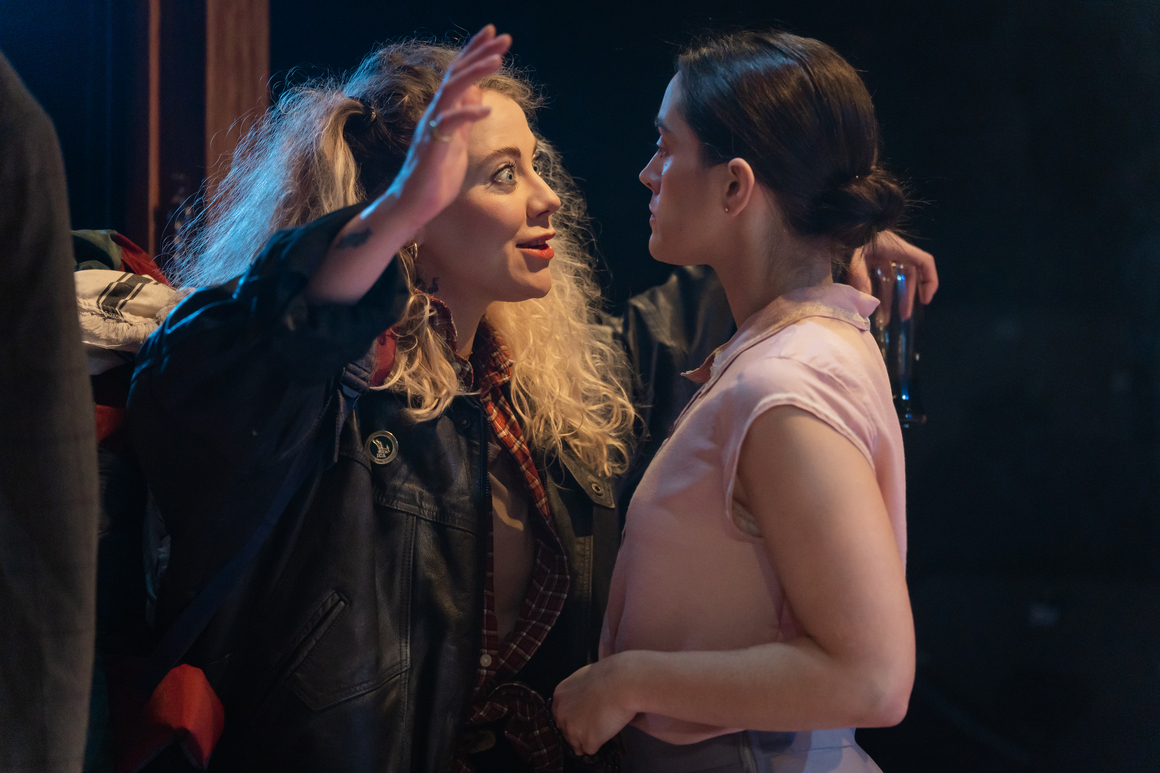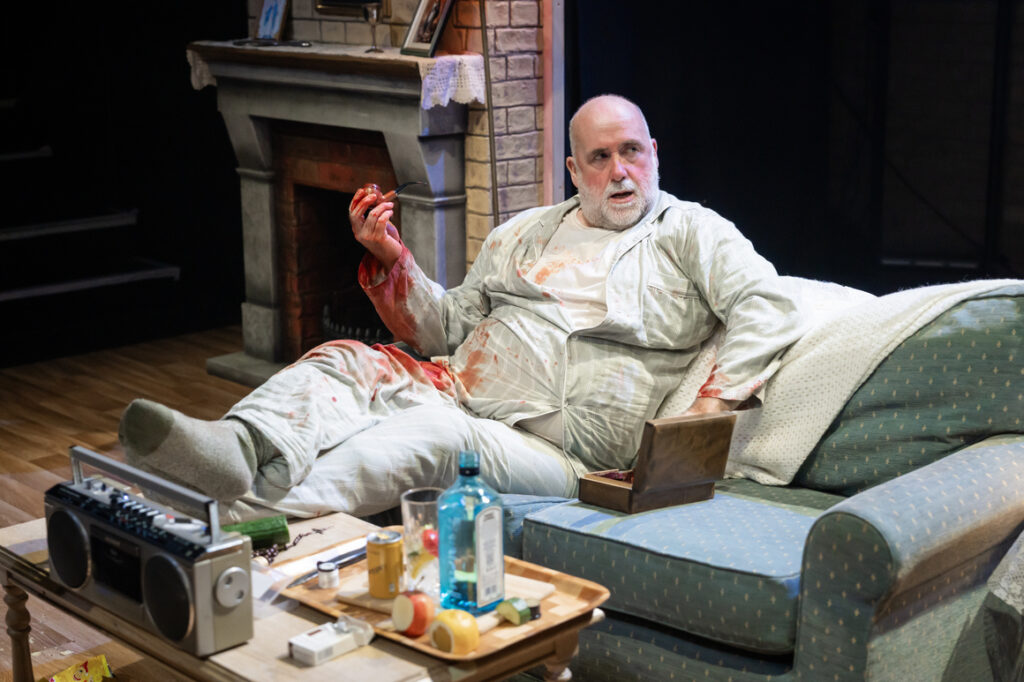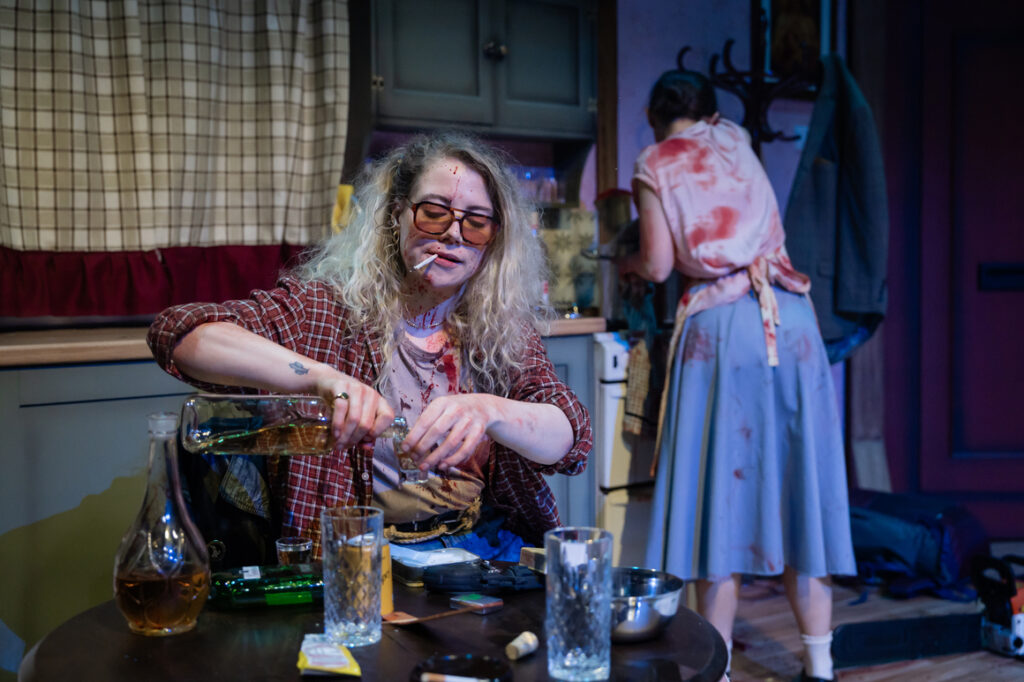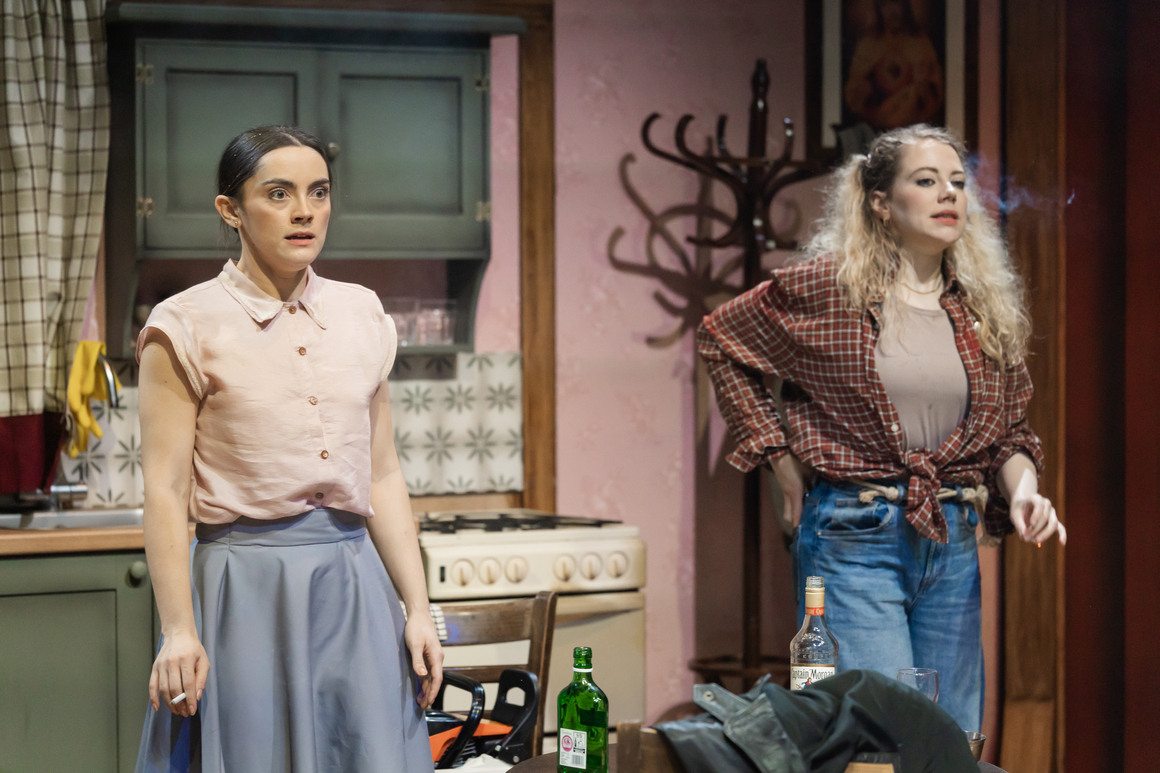Review by Simon Jenner, October 23 2025
★ ★ ★ ★ (★)
“Want me to blow the door off the hinges here?” One sister is asking another to be let into the family farmhouse. After serving eight years in prison and disappearing for a further three. But then she did burn their mother alive didn’t she? South Armagh 1989, and the (formerly) most genteel genocidal nation on earth hovers overhead in helicopters. Meghan Tyler’s 2019 Edinburgh debut Crocodile Fever is revived at the Arcola helmed by artistic director Mehmet Ergen till November 22.
Fianna Devlin (Meghan Tyler) breaks in through the kitchen window when her squeaky-pious oppressed sister Alannah (Rachael Rooney) denies her. Alannah complains Fianna’s boots are filthy on shiny worktops, a metaphor that carries till it doesn’t. “Wise up, Allie. Do you want the searchlights to catch me, like?” A play riffing lightly on the oppression outside always lets you know the pressure-cooker of home is nicely balanced by the Brits.

Meghan Tyler and Rachael Rooney. Photo Credit: Ikin Yum
Alannah looks after Peter their abusive father crippled by “accidentally” falling downstairs whilst in British custody. Later there’s a myth recalled of crocodiles being reincarnated evil humans; and you have to kill then eat them. Wild repartee doesn’t disguise the sheer poetic wit of Tyler’s writing: a beauty of demotic and metaphor worthy of Synge and the more mythic reaches of Marina Carr. Appropriate, since this is in part a feminist wink at Synge’s charcoal-grey comedy The Playboy of the Western World. Which features a man who becomes what he is after people applaud him for (apparently) killing his father. Add to Synge and Carr a pinch of Sarah Kane, Martin McDonagh, Titus Andronicus and Ionesco and you’ve the map; but the territory is all Tyler’s. The denouement is nothing you’ll see anywhere else. Funny it’s taken London six years to digest it.
Rooney’s almost robotically delivered early stutters slowly relax into the half-crushed human Alannah is. Games, playing tag with radio and all sorts of pop (ending in a Tony Bennett tape, kept in the fridge, part of Benjamin Grant’s mainly 80s sound design) bond the sisters: warily. Tyler’s given themself all the colourful speeches and Rooney’s straight-act has to modulate and unbend as Alannah reaches for figurative language too, and initially finds the formal schoolma’am. Indeed some of Tyler’s language derives from Alannah throwing out numbered biblical quotes like rosaries to ward off demons. But don’t bother, they’re here. The siblings’ rhythms are skilfully differentiated: both Tyler and Rooney bounce off this.
Fianna’s assertion of their father: “A monster cannot be fragile” occasions all sorts of stutters, but Fianna’s last three years after saving Alannah involve “further saviour activities”. Just to give a sense of the sheer verve and invention, it’s worth quoting the moment straight after, when Tyler has Fianna hint at the world outside mirroring their father: “Retract the fangs. All I’m saying is, I’ve been a lucky wee duck so far, but I could get shot dead by a dirty Para tomorrow. Or my skull might be hanging out my hole, and I could accidentally blow myself to smithereens. Or get mistaken for a dirty wee tout, and have my kneecaps shredded off in a combine harvester“. So somewhere there’s a British para looking for Fianna, or a paramilitary: but Tyler has found an explosively poetic language, where verbs do heavy lifting and nouns drop like weights.

Stephen Kennedy. Photo Credit: Ikin Yum
It’s hardly a spoiler to mention Fianna goes up stairs casually and shoots their father upstairs in the leg. Stephen Kennedy’s Pete or Da appears an almost philosophic figure. He slithers down. They go at him in singular fashion. He’s always putting his foot in it they joke (you’ll get it). But he’s still there trying to play off one against the other. Kennedy relishes the sheer reasonableness of Da’s deadpan, considering. He’s a bit like Aegisthus at the end of Sophocles’ Electra, seemingly accepting his fate; but wily, still plotting. Kennedy has far less to do, but his slow speech rhythms set off Tyler and Rooney just as they contrast with each other. He makes one misogynistic joke, just to season self-condemnation. We should have more of these or perhaps none.
Da’s misogyny and family history are only touched on, the traumas not delved into; though this is partly mythic, where such things are givens. Tyler certainly draws in plot like a centrifuge. Slow accusations of how Ma burned and a certain mute glow from Ma’s Marian-encrusted photo, suggesting she has agency beyond the grave, is another blink-and-miss. As is her abused life; where she was paradoxically a “freedom fighter”. And that’s to say nothing of the appearance of that brutish British para (a confident debut from James Pedley-Holden); whom we have scarcely time to take in, as it were. It’s an ungrateful part, adding to costs but a coup. This is where Austin Spangler’s fight direction and puppet designer Rachael Canning emerge.
Merve Yörük’s set makes as much use as possible of Studios 1’s intimate space in traverse. Following Tyler’s instructions, the kitchen (window/sink/cooker on one side, neat use of Studio 1’s mezzanine connected by staircase on the other) bursts out in grungy 80s realism. Ricard Williamson’s lighting suggests a beleaguered night, searchlights just off, and shadows where needed. Gul Sager’s period costumes dash one shirt into the mix that looks from slightly later on, but who’s counting down to truth and reconciliation anyway?
An exhilarating two hours with a necessary interval for effects just flash by in this slightly revised version. The script’s been re-edited since its initial publication (previously Oberon Books/Methuen). It may still undergo tweaks; but will settle as Tyler’s utterly distinctive debut. Bernadette Devlin McAliskey’s “Yesterday I dared to struggle, today I dare to win” is the mildest of three quotes prefacing this play. Revolvers (Countess Constance Markievicz) and eating (Rupi Kaur) frame a gratifying new tradition of what to do with the patriarchy. There’s still a sense of asymmetry, that damned para feeling like an underused luxury; and the final effects are both hilariously apt, indeed impressive, yet a bit awkward. That at least depends on production, not vision. This is still a breakthrough play and Tyler’s works are going to break things round here. A 90% production and a 100% must-see.
Assistant Director Aoife Beaumont, Associate Designer Cathan McRoberts, Costume Designer Katherine Watt, Lighting Programmer Beril Yavuz, Production Manager Joe Prentice, Stage Manager (on book) Elizabeth Khabaza, SM Tilda Finlow, Stage Management Placement Leo Tsokolaeva, Production Electrician Alex Hopkins, Production Carpenter Adam Bottomley, Production Sound Engineer Charlie Stace. Photographer Ikin Yum
Meghan Tyler and Rachael Rooney. Photo Credit: Ikin Yum



